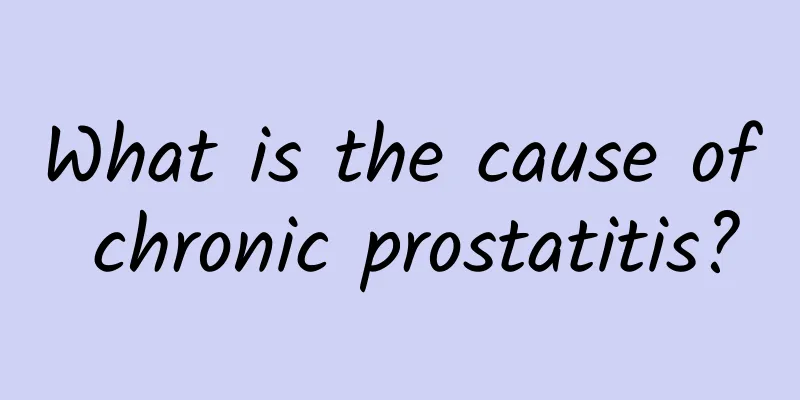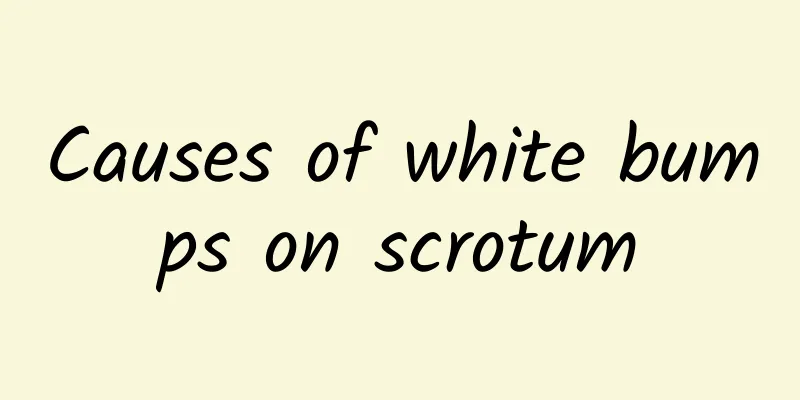What is the cause of chronic prostatitis?

|
The prostate is very important for men, but most men in life do not pay attention to the maintenance of the prostate, let alone their own health. Especially those men who do not pay attention to personal hygiene, always have close contact with different women, over time, the body will suffer great damage, and it is easy to be invaded by some infectious viruses. Chronic prostatitis is a common disease in men. What is the cause of its onset? Categories The naming of chronic prostatitis belongs to the old classification system, in which prostatitis is divided into: acute bacterial prostatitis (ABP), chronic bacterial prostatitis (CBP), chronic nonbacterial prostatitis (CNP), prostatodynia (PD). Chronic prostatitis is divided into: chronic bacterial prostatitis and chronic nonbacterial prostatitis, which are equivalent to type II and type III in the NIH classification of prostatitis. Causes 1. Chronic bacterial prostatitis The causative factor is also mainly pathogen infection, but the body's resistance is strong and/or the pathogen's virulence is weak, with retrograde infection being the main cause. The pathogens are mainly Staphylococcus, followed by Escherichia coli, Corynebacterium and Enterococcus, etc. Prostatic stones and urine reflux may be important reasons for the persistence of pathogens and recurrence of infection. 2. Chronic nonbacterial prostatitis The etiology is very complex, and its main cause may be the combined effect of pathogen infection, inflammation, abnormal pelvic floor neuromuscular activity, and immune abnormalities. (1) Pathogen infection Although routine bacterial examinations fail to isolate pathogens in patients with this type, they may still be related to certain special pathogens, such as anaerobic bacteria, L-type proteobacteria, nanobacteria, or infections with Chlamydia trachomatis and mycoplasma. Studies have shown that the detection rate of local prokaryotic DNA in patients with this type can be as high as 77%; some clinical "aseptic" prostatitis with chronic inflammation, recurrent attacks or aggravation may be related to these pathogens. Other pathogens such as parasites, fungi, viruses, trichomonas, and Mycobacterium tuberculosis may also be important pathogenic factors of this type, but there is a lack of reliable evidence and there is no unified opinion so far. (2) Urinary dysfunction Certain factors cause excessive contraction of the urethral sphincter, leading to bladder outlet obstruction and residual urine formation, causing urine to flow back into the prostate. This can not only bring pathogens into the prostate, but also directly stimulate the prostate, inducing sterile "chemical prostatitis", causing abnormal urination and pain in the pelvic area. Many patients with prostatitis have a variety of urodynamic changes, such as decreased urine flow rate, functional urinary tract obstruction, detrusor-urethral sphincter dyssynergia, etc. These functional abnormalities may be just a clinical phenomenon, and their essence may be related to various potential pathogenic factors. (3) Psychological factors Studies have shown that more than half of patients with prostatitis who have not been cured for a long time have obvious changes in mental and psychological factors and personality traits. Such as anxiety, depression, hypochondria, hysteria, and even suicidal tendencies. These changes in mental and psychological factors can cause autonomic nervous system dysfunction, resulting in posterior urethral neuromuscular dysfunction, leading to pelvic pain and urination dysfunction; or cause changes in the function of the hypothalamus-pituitary-gonadal axis and affect sexual function, further aggravating symptoms. Eliminating mental tension can relieve or cure symptoms. However, it is not clear whether mental and psychological changes are the direct cause or secondary manifestations. (4) Neuroendocrine factors Patients with prostatitis are often prone to fluctuations in heart rate and blood pressure, indicating that it may be related to autonomic nervous system reactions. The pain has the characteristics of visceral pain. Local pathological stimulation of the prostate and urethra triggers spinal reflexes through the afferent nerves of the prostate, activates astrocytes in the lumbar and sacral spinal cord, and the nerve impulses are transmitted through the genitofemoral nerve and ilioinguinal nerve. The sympathetic nerve endings release norepinephrine, prostaglandins, calcitonin gene-related peptides, P substances, etc., causing bladder and urethral dysfunction, and leading to abnormal activity of the perineum and pelvic floor muscles, and persistent pain and referred pain in the corresponding areas outside the prostate. (5) Abnormal immune response Recent studies have shown that immune factors play a very important role in the development and course of type III prostatitis. Changes in the levels of certain cytokines, such as IL-2, IL-6, IL-8, IL-10, TNF-α and MCP-1, may occur in the prostatic fluid and/or plasma and/or tissue and/or blood of patients. Moreover, the IL-10 level is positively correlated with the pain symptoms of patients with type III prostatitis. The use of immunosuppressants for treatment has a certain effect. If you suffer from chronic prostatitis, you should seek psychological counseling in time and seek help from a psychologist, so that you can maintain an optimistic attitude. At the same time, in addition to necessary treatment, you should also quit eating irritating foods. Don't always hold your urine because you are busy with work. |
<<: Why do men have frequent urination and incomplete urination?
>>: What causes pain in the left lower abdomen in men?
Recommend
What causes wetness under the testicles?
For male friends, you must pay attention to your ...
What medicine should men take for sexual dysfunction
The decline of male sexual function includes erec...
Is sex important to men?
Sex is actually very common to many people, and i...
Is testicular contraction normal?
The testicle is a male reproductive organ. It is ...
If men don’t do this often, be careful not to gain weight suddenly!
What is beauty nowadays? Many people say that thi...
Men's Autumn Skin Care
Loving beauty is no longer just a female thing. M...
Why does it hurt when men urinate?
I believe many men have encountered this problem,...
Garlic treats hemorrhoids, garlic also has such magical effects
Hemorrhoids are a common disease that occurs most...
How to treat male impotence and premature ejaculation
How to cure impotence and premature ejaculation? ...
Are men with thick beards more capable?
Compared with those who shave every day, people w...
Can a patient with prostate cancer bone metastasis live 15 years?
The problem of prostate cancer is actually quite ...
What happens if pimples appear on the male genitals?
For men, the genitals are very sensitive and impo...
Newly married men should eat more of this
Getting married is a very happy thing. I believe ...
The dangers of hidden testicles
Many people do not take the problem of hidden tes...
The principle of electronic smoking cessation and the correct way to use electronic cigarettes
Smoking is a way for many men to relieve their tr...









